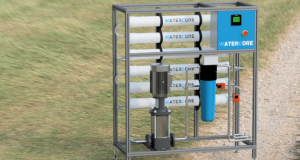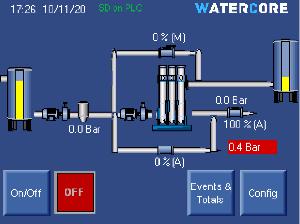
Sustainable irrigation via reverse osmosis desalination
When high-salinity bore water is treated via reverse osmosis desalination, all damaging salts, including sodium and chloride are removed.
Salinity has a big impact on the plant capacity to absorb water and nutrients from the soil. In fact, salt has always been a common do-it-yourself solution for killing undesirable weeds as it blocks their capacity to absorb water and dehydrates the plant. In the presence of high salinity water, plants undergo a stress similar to drought, even when plenty of water is present.
In addition to reducing the plant’s ability to extract water from the soil, water salinity is also responsible for poor germination and diminished crop growth. Different salts have different levels of impact on plant growth, however chloride and sodium, which are two of the most common salts in bore water, are the most damaging ions, chloride being particularly toxic.
The amount of land affected by increased salinity levels is growing at an alarming rate every year, reducing the land capacity to provide the expected crops and financial returns and increasing the overall erosion.
The use of salty water is not the only factor increasing the soil salinity. Another poor management practice is the use of excessive amounts of fertilisers. These fertilisers are complex organic compounds that increase the precipitation of other salts and, when applied in excess, the combined effect is actually counterproductive for the health of the plants.
Eventually, the cycles of inadequate irrigation water and too many fertilisers make the soil too salty for plant growth. Once plants can’t grow, erosion takes over to become a second major problem.
Rainwater has a very low salinity (in the range of 20 mg/l), is free of chemicals and other pollutants and represents a healthy water supply for plants which is also beneficial for the soil. Rainwater is scarce and unpredictable, so it can’t be used as the main water source for any agricultural business.
On the other hand, groundwater, typically obtained from underground bores, is typically high in salts, such as sodium and chloride, and other contaminants. Salinity level is a key indicator of the quality of any bore.
When high-salinity bore water is treated with reverse osmosis desalination, all the damaging salts, including sodium and chloride plus bacteria, are removed. Reverse osmosis provides consistent high-quality water for irrigation, delivering the best rain-like water for any crop.
What are the main benefits of using reverse osmosis systems in irrigation:
Constant rain-quality water
Independent from seasonal rainfall
No need for large storage tanks
Higher crop yields
Low cost per liter of irrigation water
Better plant growth and resistance
Watercore design, manufacture and maintain a wide range of water and wastewater treatment systems for industrial and commercial applications: Iron filtration, reverse osmosis systems, chlorination and UV disinfection, water softening etc.
Focusing on industrial and commercial projects, Watercore combines different technologies to succeed in each industry: cooling systems, boilers, irrigation water, etc. In remote communities, Watercore collaborates to supply reliable safe drinking water and upgrade of distribution systems and treatment plants.
David Garcia
Watercore
+61 1300 742 010
dgarcia@watercore.com.au
Visit us on social media:
Facebook
Twitter
LinkedIn
EIN Presswire does not exercise editorial control over third-party content provided, uploaded, published, or distributed by users of EIN Presswire. We are a distributor, not a publisher, of 3rd party content. Such content may contain the views, opinions, statements, offers, and other material of the respective users, suppliers, participants, or authors.




